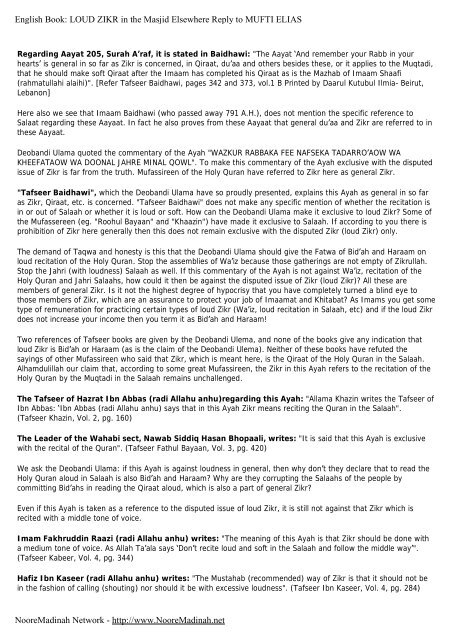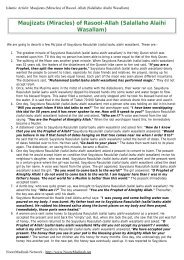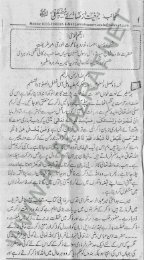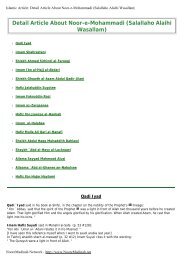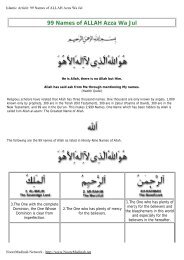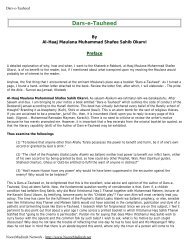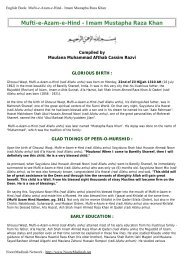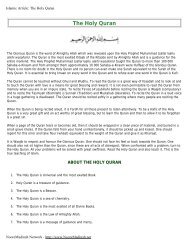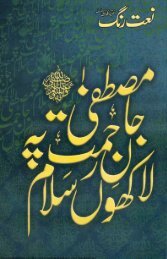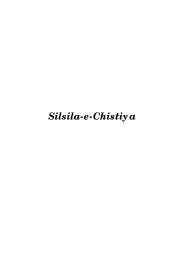LOUD ZIKR in the Masjid & Elsewhere & Reply to MUFTI ELIAS
LOUD ZIKR in the Masjid & Elsewhere & Reply to MUFTI ELIAS
LOUD ZIKR in the Masjid & Elsewhere & Reply to MUFTI ELIAS
Create successful ePaper yourself
Turn your PDF publications into a flip-book with our unique Google optimized e-Paper software.
English Book: <strong>LOUD</strong> <strong>ZIKR</strong> <strong>in</strong> <strong>the</strong> <strong>Masjid</strong> <strong>Elsewhere</strong> <strong>Reply</strong> <strong>to</strong> <strong>MUFTI</strong> <strong>ELIAS</strong><br />
Regard<strong>in</strong>g Aayat 205, Surah A’raf, it is stated <strong>in</strong> Baidhawi: "The Aayat ‘And remember your Rabb <strong>in</strong> your<br />
hearts’ is general <strong>in</strong> so far as Zikr is concerned, <strong>in</strong> Qiraat, du’aa and o<strong>the</strong>rs besides <strong>the</strong>se, or it applies <strong>to</strong> <strong>the</strong> Muqtadi,<br />
that he should make soft Qiraat after <strong>the</strong> Imaam has completed his Qiraat as is <strong>the</strong> Mazhab of Imaam Shaafi<br />
(rahmatullahi alaihi)". [Refer Tafseer Baidhawi, pages 342 and 373, vol.1 B Pr<strong>in</strong>ted by Daarul Kutubul Ilmia- Beirut,<br />
Lebanon]<br />
Here also we see that Imaam Baidhawi (who passed away 791 A.H.), does not mention <strong>the</strong> specific reference <strong>to</strong><br />
Salaat regard<strong>in</strong>g <strong>the</strong>se Aayaat. In fact he also proves from <strong>the</strong>se Aayaat that general du’aa and Zikr are referred <strong>to</strong> <strong>in</strong><br />
<strong>the</strong>se Aayaat.<br />
Deobandi Ulama quoted <strong>the</strong> commentary of <strong>the</strong> Ayah "WAZKUR RABBAKA FEE NAFSEKA TADARRO’AOW WA<br />
KHEEFATAOW WA DOONAL JAHRE MINAL QOWL". To make this commentary of <strong>the</strong> Ayah exclusive with <strong>the</strong> disputed<br />
issue of Zikr is far from <strong>the</strong> truth. Mufassireen of <strong>the</strong> Holy Quran have referred <strong>to</strong> Zikr here as general Zikr.<br />
"Tafseer Baidhawi", which <strong>the</strong> Deobandi Ulama have so proudly presented, expla<strong>in</strong>s this Ayah as general <strong>in</strong> so far<br />
as Zikr, Qiraat, etc. is concerned. "Tafseer Baidhawi" does not make any specific mention of whe<strong>the</strong>r <strong>the</strong> recitation is<br />
<strong>in</strong> or out of Salaah or whe<strong>the</strong>r it is loud or soft. How can <strong>the</strong> Deobandi Ulama make it exclusive <strong>to</strong> loud Zikr? Some of<br />
<strong>the</strong> Mufassereen (eg. "Roohul Bayaan" and "Khaaz<strong>in</strong>") have made it exclusive <strong>to</strong> Salaah. If accord<strong>in</strong>g <strong>to</strong> you <strong>the</strong>re is<br />
prohibition of Zikr here generally <strong>the</strong>n this does not rema<strong>in</strong> exclusive with <strong>the</strong> disputed Zikr (loud Zikr) only.<br />
The demand of Taqwa and honesty is this that <strong>the</strong> Deobandi Ulama should give <strong>the</strong> Fatwa of Bid’ah and Haraam on<br />
loud recitation of <strong>the</strong> Holy Quran. S<strong>to</strong>p <strong>the</strong> assemblies of Wa’iz because those ga<strong>the</strong>r<strong>in</strong>gs are not empty of Zikrullah.<br />
S<strong>to</strong>p <strong>the</strong> Jahri (with loudness) Salaah as well. If this commentary of <strong>the</strong> Ayah is not aga<strong>in</strong>st Wa’iz, recitation of <strong>the</strong><br />
Holy Quran and Jahri Salaahs, how could it <strong>the</strong>n be aga<strong>in</strong>st <strong>the</strong> disputed issue of Zikr (loud Zikr)? All <strong>the</strong>se are<br />
members of general Zikr. Is it not <strong>the</strong> highest degree of hypocrisy that you have completely turned a bl<strong>in</strong>d eye <strong>to</strong><br />
those members of Zikr, which are an assurance <strong>to</strong> protect your job of Imaamat and Khitabat? As Imams you get some<br />
type of remuneration for practic<strong>in</strong>g certa<strong>in</strong> types of loud Zikr (Wa’iz, loud recitation <strong>in</strong> Salaah, etc) and if <strong>the</strong> loud Zikr<br />
does not <strong>in</strong>crease your <strong>in</strong>come <strong>the</strong>n you term it as Bid’ah and Haraam!<br />
Two references of Tafseer books are given by <strong>the</strong> Deobandi Ulema, and none of <strong>the</strong> books give any <strong>in</strong>dication that<br />
loud Zikr is Bid’ah or Haraam (as is <strong>the</strong> claim of <strong>the</strong> Deobandi Ulema). Nei<strong>the</strong>r of <strong>the</strong>se books have refuted <strong>the</strong><br />
say<strong>in</strong>gs of o<strong>the</strong>r Mufassireen who said that Zikr, which is meant here, is <strong>the</strong> Qiraat of <strong>the</strong> Holy Quran <strong>in</strong> <strong>the</strong> Salaah.<br />
Alhamdulillah our claim that, accord<strong>in</strong>g <strong>to</strong> some great Mufassireen, <strong>the</strong> Zikr <strong>in</strong> this Ayah refers <strong>to</strong> <strong>the</strong> recitation of <strong>the</strong><br />
Holy Quran by <strong>the</strong> Muqtadi <strong>in</strong> <strong>the</strong> Salaah rema<strong>in</strong>s unchallenged.<br />
The Tafseer of Hazrat Ibn Abbas (radi Allahu anhu)regard<strong>in</strong>g this Ayah: "Allama Khaz<strong>in</strong> writes <strong>the</strong> Tafseer of<br />
Ibn Abbas: ‘Ibn Abbas (radi Allahu anhu) says that <strong>in</strong> this Ayah Zikr means recit<strong>in</strong>g <strong>the</strong> Quran <strong>in</strong> <strong>the</strong> Salaah".<br />
(Tafseer Khaz<strong>in</strong>, Vol. 2, pg. 160)<br />
The Leader of <strong>the</strong> Wahabi sect, Nawab Siddiq Hasan Bhopaali, writes: "It is said that this Ayah is exclusive<br />
with <strong>the</strong> recital of <strong>the</strong> Quran". (Tafseer Fathul Bayaan, Vol. 3, pg. 420)<br />
We ask <strong>the</strong> Deobandi Ulama: if this Ayah is aga<strong>in</strong>st loudness <strong>in</strong> general, <strong>the</strong>n why don’t <strong>the</strong>y declare that <strong>to</strong> read <strong>the</strong><br />
Holy Quran aloud <strong>in</strong> Salaah is also Bid’ah and Haraam? Why are <strong>the</strong>y corrupt<strong>in</strong>g <strong>the</strong> Salaahs of <strong>the</strong> people by<br />
committ<strong>in</strong>g Bid’ahs <strong>in</strong> read<strong>in</strong>g <strong>the</strong> Qiraat aloud, which is also a part of general Zikr?<br />
Even if this Ayah is taken as a reference <strong>to</strong> <strong>the</strong> disputed issue of loud Zikr, it is still not aga<strong>in</strong>st that Zikr which is<br />
recited with a middle <strong>to</strong>ne of voice.<br />
Imam Fakhrudd<strong>in</strong> Raazi (radi Allahu anhu) writes: "The mean<strong>in</strong>g of this Ayah is that Zikr should be done with<br />
a medium <strong>to</strong>ne of voice. As Allah Ta’ala says ‘Don’t recite loud and soft <strong>in</strong> <strong>the</strong> Salaah and follow <strong>the</strong> middle way’".<br />
(Tafseer Kabeer, Vol. 4, pg. 344)<br />
Hafiz Ibn Kaseer (radi Allahu anhu) writes: "The Mustahab (recommended) way of Zikr is that it should not be<br />
<strong>in</strong> <strong>the</strong> fashion of call<strong>in</strong>g (shout<strong>in</strong>g) nor should it be with excessive loudness". (Tafseer Ibn Kaseer, Vol. 4, pg. 284)<br />
NooreMad<strong>in</strong>ah Network - http://www.NooreMad<strong>in</strong>ah.net


